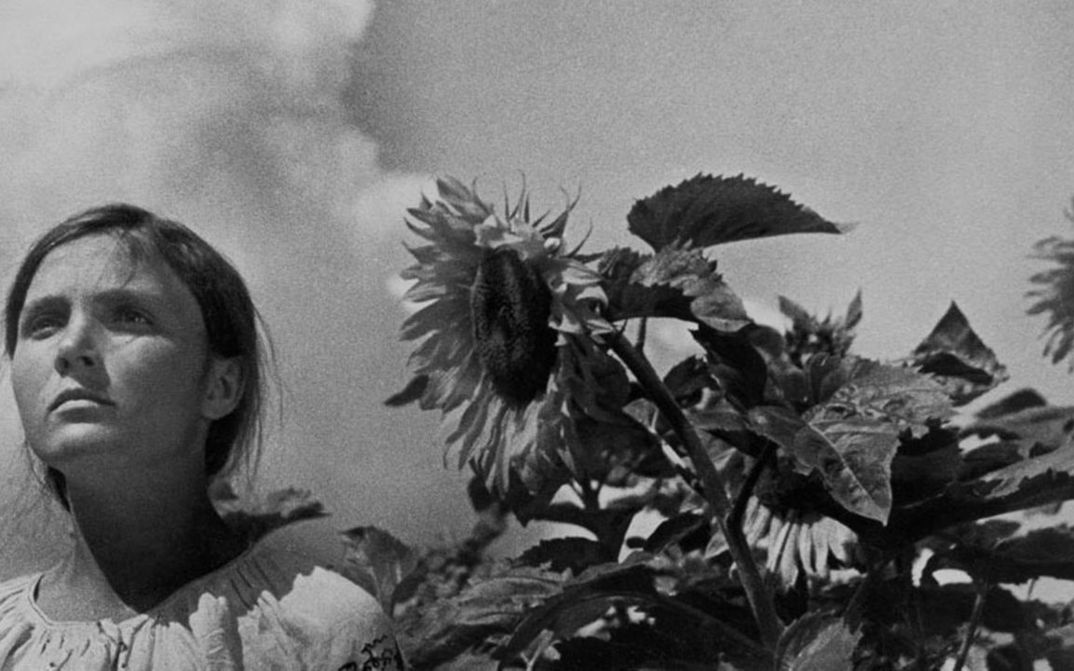
Sat 21.01.
20:30
Director
Oleksandr Dovzhenko
USSR / 1930
78 min.
/ DCP
/ Original version with English subtitles
Music
Dakha Brakha
Program
Cold and New Wars
Cinema
Arsenal 1
zu den Ticketszu dem KalenderIntroduction (by video): Oleksandr Teliuk (Dovzhenko Centre, Kyiv)
On the occasion of the 100th anniversary of Jonas Mekas' birth, the Dovzhenko Centre in Kyiv had also planned a comprehensive retrospective on Jonas Mekas for the summer of 2022.
A key role in this was to be given to the relationship between Jonas Mekas and the Kyiv-born avant-garde filmmaker, performer, and theorist Maya Deren. Like Mekas, Deren was also affected by escape from her homeland. Her parents fled with her from anti-Semitic pogroms in Kyiv to the United States in 1922. There, in the 1940s and '50s, she became the most influential film theorist and director in the otherwise male-dominated avant-garde scene.
Mekas first met Maya Deren in 1953. She became an important mentor to him, and he emphasized her lifelong pioneering role in U.S. avant-garde art and New American Cinema. The two were united not only by their Eastern European heritage, but also by their interest in a deeply personal and independent cinema.
The Jonas Mekas retrospective scheduled for last summer at the Dovzhenko Center has been postponed until further notice. Not only does Russia's war of aggression against Ukraine threaten the existence of the world-renowned Dovzhenko Centre, but an administrative reform also threatens the defacto dissolution of the Center.
Therefore, in solidarity with the Dovzhenko Centre and Ukrainian filmmakers, first, we will show Maya Deren's RITUAL IN TRANSFIGURED TIME (1946). "Ritual is about the nature and process of change”, explained Deren in a letter. In the film she transforms ordinary movements into dance movements and shows illusive movements that lead to illusive identities. The artificial movements of those acting and dancing are always presented as movements that were created by the camera in the first place.
Oleksandr Dovzhenko's ZEMLIA (Earth) is also "about nature and the process of change." The "film-poem" tells the story of Ukrainian "kulaks" who resist Stalin's plan to collectivize their farms and is at the same time a hymn to the natural passing of life and death. It is a passionate tribute to the countryside, and to the people that work on it. Full of lyrical pantheism and utopian exaltation, it demonstrated the ambiguity of Ukrainian geopolitical choice in the 1920s. Due to lack of support for collectivization efforts, the film was banned in the Soviet Union for almost 30 years.
The film will be shown in the restored version by the Dovzhenko Centre with Ukrainian intertitles. The new soundtrack for ZEMLIA was created by Ukrainian ethno-chaos band DakhaBrakha.
Program:
Ritual in Transfigured Time Maya Deren USA 1946 16 mm silent 15 min.
Reading: Eglė Lukšaitė and Goda Palekaitė, from writings by Jonas Mekas
356 Day Project (Selection) Jonas Mekas USA 2007 Digital file OV 5 min.
Zemlya Earth Oleksandr Dovzhenko UdSSR 1930 DCP OV/EnS 78 min.
From the collection of Dovzhenko Centre, Kyiv
Introduction (online): Oleksandr Teliuk (Dovzhenko Centre, Kyiv)